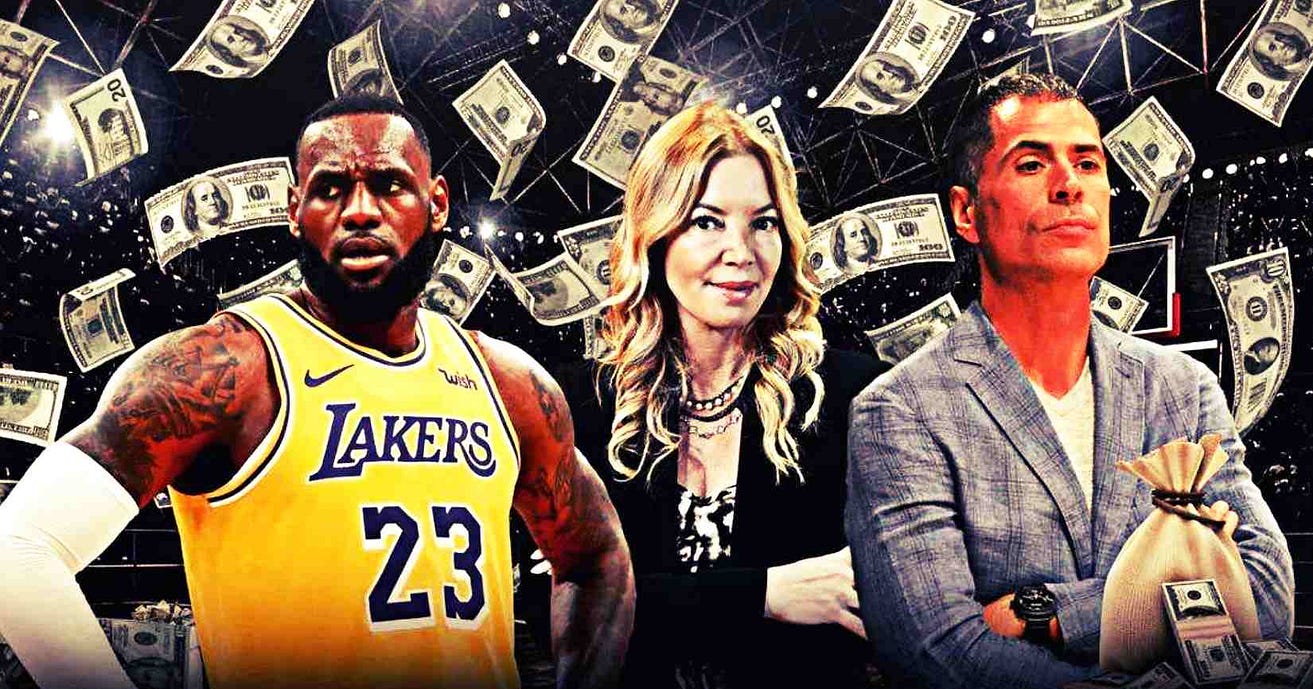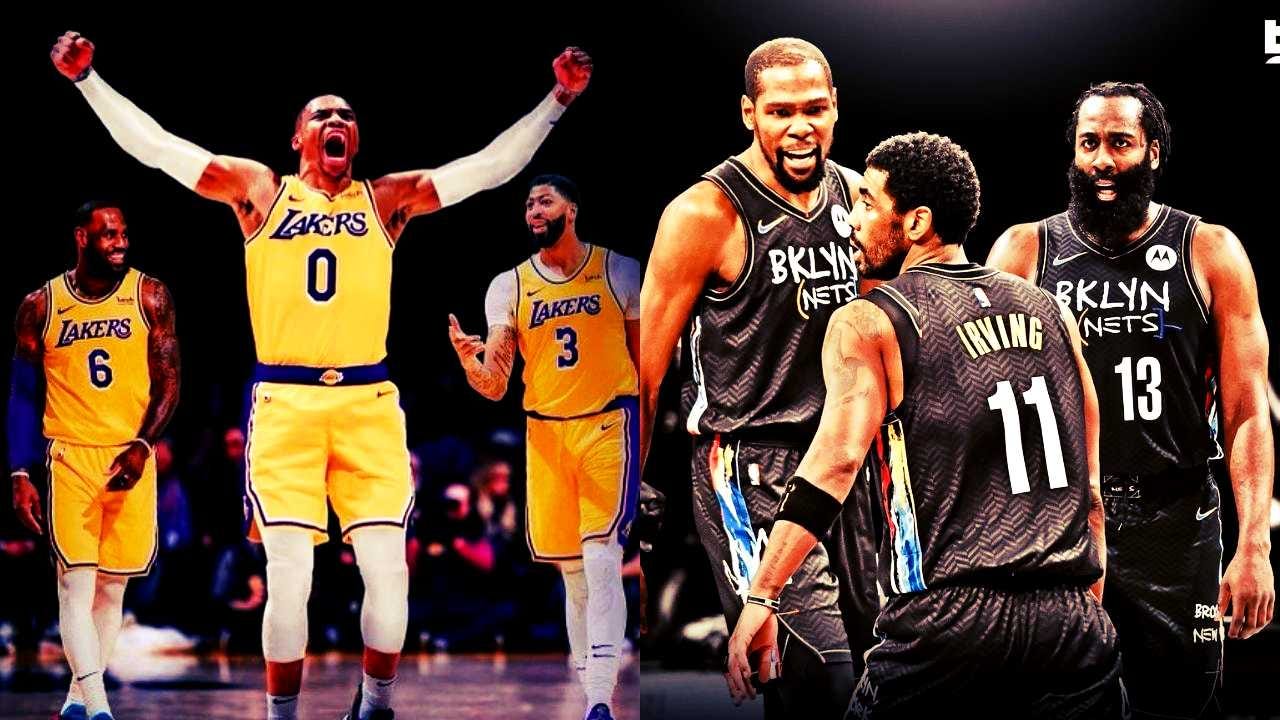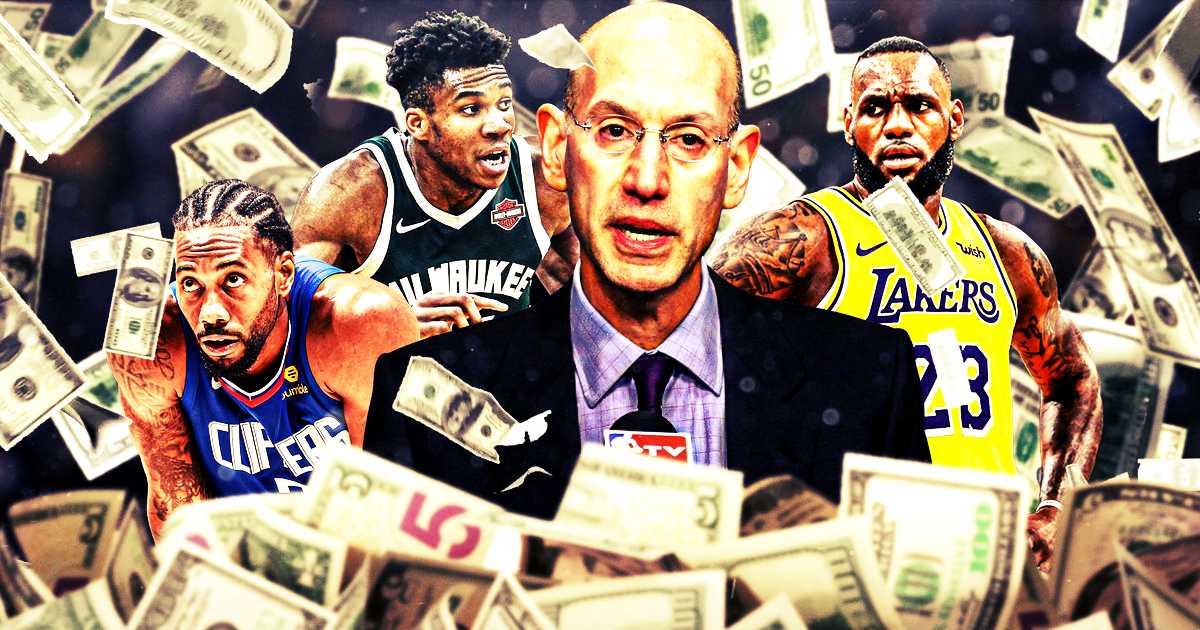If the Los Angeles Lakers hope to compete for championships in a league where the challenge and financial investment to win titles have dramatically increased, they must be willing to pay the price to be a legitimate contender.
After winning their 17th championship in the bubble eighteen months ago, the Lakers struggled to stay competitive as injuries and Covid battered the roster and poor decisions and cap and tax strategies derailed progress. Suddenly, the NBA’s most storied franchise is facing a series of franchise defining decisions with major short and long-term implications as their usual championship team building strategies no longer seem to be working.
What’s happened is the competitive landscape for the NBA has changed and the price of admission to be a legitimate contender in the league today now requires top teams to accept gargantuan payrolls and mega luxury taxes. The last two years, the Lakers’ personnel decisions were driven by their old school strategies of trading for a third superstar, optimizing cap flexibility by only adding players on short term deals, and avoiding luxury taxes.
Unfortunately, those strategies led the Lakers to trade for Westbrook, build a roster of minimum salary players with no trade value, and lose valuable assets like Alex Caruso and Dennis Schroder to free agency with no return. Unable to find a deal at the trade deadline, the Lakers doubled down on the same outdated approach, positioning themselves to use Russ’ $47 million expiring contract and two first round picks to trade for Damian Lillard.
Lakers must accept the rules have changed. Tradeable players on long-term deals are better than cap space, mega luxury taxes are the new price of admission to compete, and two superstars and depth are better than three.
1. Tradeable Players on Long-Term Deals Are Better Than Cap Space

The Lakers’ approach to team building has always favored cap space and players on 1-year deals over players on multiple-year contracts. The Lakers need to rethink this strategy as it limits both team talent and continuity.
with 13 of the 15 players on their roster making either max or minimum salaries, the Lakers’ ability to take advantage of trade opportunities to improve their roster are severely limited as we’ve seen the past two years. Cap space is great if you’re trying to sign LeBron James as your centerpiece but filling a roster with nothing but minimum salary players on 1-year deals limits the talent you can sign and your trading chips to get better.
The trade the Clippers made to land Powell and Covington, two players who would have been great fits on the Lakers, was a perfect example of a trade opportunity for which the Lakers simply did not have the assets to pull off. That’s why not failing to re-sign Caruso and Schroder as trading chips was a serious mistake. Standing pat at the trade deadline also did nothing to help the Lakers be in a better position with respect to trading chips this summer.
The key to putting the best possible team on the court and retaining the flexibility to free up cap space or come up with the assets needed to take advantage of trade opportunities is signing players to tradeable contracts. Signing key players you can easily move if necessary is a smarter strategy than turning over an entire roster of 1-year deals like the Lakers did the last two seasons. It gives you better players and a chance to build continuity.
Settling for 1-year deals to pursue cap space flexibility limits the talent a team can put on the court, the continuity teams needs to be a winner, and the trading chips to take advantage of opportunities to improve the roster.
2. Mega Luxury Taxes Are Price of Admission to Compete for Title

While NBA teams have recently made moves to reduce luxury tax bills, the Lakers are unique among major big market competitors in that they’ve been unwilling to pay mega luxury taxes like the Warriors, Clippers, and Nets.
We’ve seen that in the Lakers’ decision not to re-sign Alex Caruso, a player whom they could have definitely used as a trading chip at the deadline or as a key rotation piece as they struggle to win enough games to make the playoffs. We’ve also seen the Lakers’ refuse at the deadline to accept the Rockets offer of Christian Wood in trade because of the luxury taxes re-signing a young talent like Wood could ultimately cost the franchise.
While the Lakers were never willing to pay significant luxury taxes back in the days the franchise was run by Dr. Jerry Buss, times have changed and big market teams like the Warriors, Clippers, and Nets have raised the bar. While the Lakers may not have billionaire owners like other franchises, they need to continue to invest in building their brand by doing what they have to do to compete in today’s NBA, even if that means mega luxury taxes.
With the salary cap and luxury tax threshold increasing next year, NBA teams as a whole seem to be making moves to limit how much luxury taxes they will have to pay, especially the small market teams who never pay taxes. Unfortunately, big market teams seem intent on raising the bar to compete for an NBA championship. There was a point when the Warriors, Clippers, and Nets were slated to pay over $100 million in luxury taxes.
The Lakers need to wake up and understand that the reason the franchise is worth almost $5 billion is because of the 17 NBA championships they have won. Luxury taxes are the new price of admission to be NBA champions.
3. Two Superstars with Deep Roster Better Than Three Superstars

The Lakers’ and Nets’ experience with superstar big threes suggests two superstars with a deeper balanced roster could be the better team building model than three superstars for winning multiple NBA championships.
The two superstar model is just easier to put together. Just look at the potential personality and fit issues a team encounters trying to make three superstars work. There’s something about ’two’s company, three’s a crowd.’ That’s not even dealing with the issue that there’s only two other starters, which makes building a viable two-way starting and closing lineup near impossible, especially if all you can afford are players on minimum salaries.
Right now, the Lakers’ 15-man roster consists of 3 superstars on maximum deals, 2 players in Horton-Tucker ($9.5 million) and Nunn ($5 million) on non-minimum contracts, and 10 players on rookie or vet minimum deals. Being so top heavy, the Lakers other starters should logically be Talen and Kendrick since they’re being paid more. Unfortunately, Horton-Tucker has regressed from his sophomore season and Nunn has not been able to play.
Imagine if the Los Angeles Lakers could replace Westbrook and his $44.2 million salary with three high quality rotation players like Eric Gordon ($18.2 million), Christian Wood ($13.6 million), and Alec Burkes ($9.5 million)? That’s basically the route the Lakers should be looking to take this summer by trading Westbrook to the Thunder for Derrick Favors ($9.5 million) and a $34.7 million trade exception to acquire additional players.
While the Lakers are anxious to find a third superstar to replace LeBron James when he retires, right now they need to focus on finding two or three quality championship caliber players to complement their two superstars.

https://twitter.com/LakerTom/status/1494432550357389312
Thing is….we knew this is the position we would be in as soon as we signed Lebron. It’s happened everywhere he’s gone. You end up with an older roster and then bare cupboards once he leaves. Luckily we got 1 tainted ring* out of it all. Jeannie should’ve planned for this but she just isn’t committed to go crazy into the luxury tax penalties (neither was Dr. Buss tbh). Say what you want about Cavs owner Dan Gilbert, but that dude consistently paid the freight attempting to win while he had Lebron in Cleveland. I remember back when Kobe had to be out here making threats in the parking lot because they were surrounding him with the likes of Smush Parker and Slava Medvedenko.
And Chris Mihm.
Kobe just said “F this” and stopped shooting in a freakin playoff game in order to make his point. This is what you wanna trot out here? Here ya go….
It’s not often Tom and I see eye to eye on things but this post is about as close as it’ll ever get. Stellar.
1) This is the only one I have minor quibbles about. It all depends on the players and the team’s commitment to point #2 which is the crux of success, especially in the NBA. Take last season’s Lakers, for instance. Plenty of tradeable, talented players who just couldn’t get it done in a 7 game series against the eventual conference champs. Talent takes on a new dimension in the playoffs and the most talented are generally the highest paid. So, in terms of talent I think you want to prioritize building a high talent roster. You’ll never hear me denounce chemistry and continuity, I’ve wanted to basically run it back every season since we acquired LeBron. Minor changes? Sure. Roster overhaul like we’ve seen two seasons running…after winning it all? Don’t think it’s smart and I think we’re seeing that play out in real time.
2) This is the crux. If the team is willing to spend then anything is possible. You can land a Big 3, supply them with talented role-players and fill out the edges with vet minimums. We did the complete opposite. Traded away our most desired assets (and contracts) and then basically refused to use 2 out of the other 3 tools we had at our disposal to build out the best roster we could. I think that, had we kept Caruso and properly used Dennis and his Bird Rights this team would look incredibly different. Certainly better defense just by holding onto Alex and we could have avoided triggering the hard cap by using Dennis in a S&T for an exception). Since we chose to retain only one player using Bird Rights of the two we could have and thumbed our nose at properly using Dennis to show him how little he could be worth (and showing the same in ourselves in the same process as in THE LAKERS ARE CHEAP NOW!!!!) we handicapped everyone else. LeBron, AD, Rob, Russ, frank and so on. If the team won’t spend 1 and 3 kind of take a lesser significance but still are smart fundamental philosophical pillars.
3) This one is hard to accept on face value without context. Which 3 superstars and which decent role players? Also, because of how Years of Service works, we’re talking about very different sums of money to say nothing of the “drafted player who meets the criteria for the super-dooper max. So, like I said in #1, you’ll never hear me decry a deep team or chemistry. But to say that always 2 is better than 3 if paired with solid value players is a little much for to buy in wholly on. Now I do 100% agree that the only sensible way to move on from Russ’ deal…should that be the actual route we take (no guarantee on that one)…is to break his big deal up into smaller deals. There are several scenarios I can envision (Boston with Paul, Kevin and Ray/Miami with James, Bosh and Wade) where each superstar takes just a little less and facilitates a big 3 AND a solid team.
Building a team is hard enough without handicapping yourself with an artificial spending ceiling. We could have hard-capped ourselves by S&Ting Dennis and Alex’s cost could have been reduced by reducing our tax bill in any season after this. Not sure what liquidity problems the ownership cabal is facing but it feels silly to me that they think this will work. It won’t. They could do a lot worse then heeding all 3 points listed above.
Aloha Tom, I pretty much agree with everything you wrote. but unless we can find a way to move Russ, its going challenging to do much about it. we really painted ourselves in a corner by not retaining Alex. what really upsets me is we signed Avery for 2.68 mil. signing Alex would have only added 5.9 mil to our salaries. that is cheap as can be. we are in a position that we cant even increase salaries since every body is under contract. we only have the bi anual exception, the mini Mle and Marc’s 2.5 mil trade exception. i am hoping for the best and that we can move Russ, but we may not get out of this mess until 2023.
The one thing none of us disagree with is the Lakers need to stop being cheap and invest in the team to be the best in the league. Anything short of that is not acceptable. Sell the freaking franchise if you can’t compete. We are not the fucking Sacramento Kings.
How about dont make any obviously asinine moves. If the blogosphere can immediately tell you not to do something and be unequivocally be right about it, you don’t do it. Mozgov. Deng. Russ. It didn’t take Jerry West to know these were bad moves. Avoiding these self-inflicted wounds would have gone a long way towards a winning product, wise spending, and an overall greater degree of faith in believing they know what the F they’re doing.
But they’re the experts and we’re the amateurs?
Thanks for reading and commenting, Jamie. Good tradeable contracts are obviously the key. You certainly don’t want contracts like Tobias Harris or Russell Westbrook, unless they’re expiring. What you want are those $10 to $20 million per year deals where the players is paid fairly or underpaid. Those contracts are easy to move when you need to, often without having to add a sweetener. Caruso is the perfect example. Had we had Alex’s contract, we coud easily have moved it to OKC or somewhere if needed down the road with no sweetener. Might even have gotten a sweetener to trade him.
I think Lakers fans are completely in agreement that the Lakers need to stop the cheap moves to save pennies in a league where millions and billions are the issues. As the article says…
“The Lakers must accept the rules have changed. Tradeable players on long-term deals are better than cap space, mega luxury taxes are the new price of admission to compete, and two superstars and depth are better than three.”